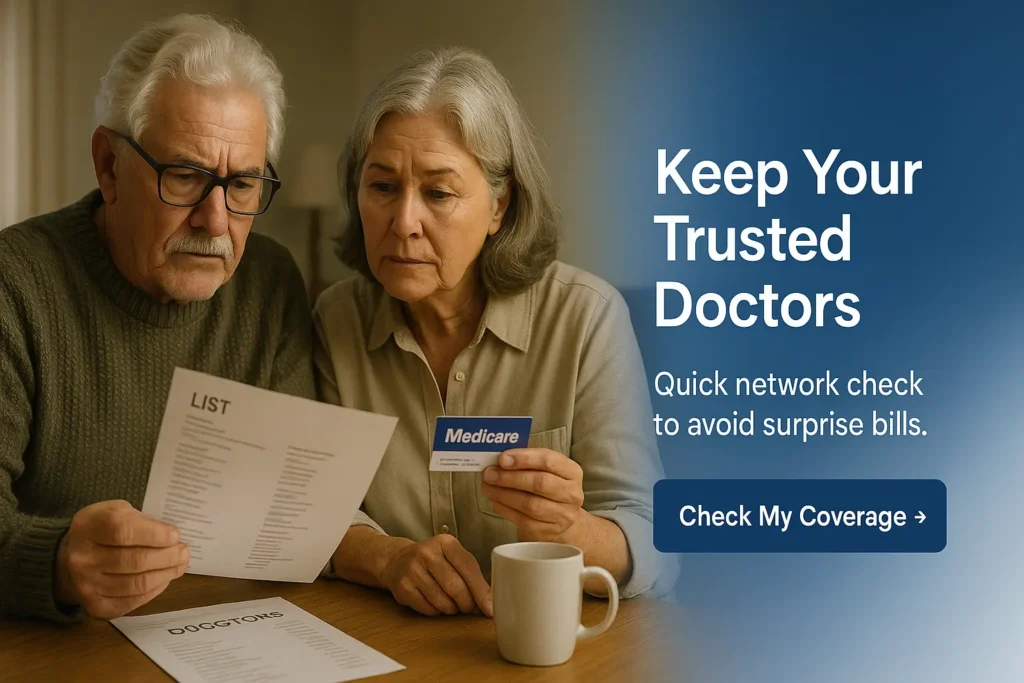Home > Medicare > Medicare Doctor Network Check

Are Your Doctors Still in Network? What Medicare Beneficiaries Need to Check in 2026
One of the most common — and costly — surprises Medicare beneficiaries face is finding out their doctor is no longer in their plan’s network. In 2026, provider networks are changing more often than ever. That means the family doctor you’ve trusted for years, the heart specialist you see every few months, or even your local hospital may not be covered anymore.
If you don’t double-check, you could end up with bigger bills or, worse, lose access to the care you rely on. The good news? Palmetto Mutual’s local experts are here to guide you step by step. We’ll show you how to make sure your doctors, specialists, and hospitals are still included in your plan — so you can stay protected, avoid stress, and keep your healthcare on track.
Why Provider Networks Change Every Year
Your doctor network is like a pressure gauge ⚖️ — the readings shift constantly, and if you don’t keep an eye on it, you may not notice when things move into the red zone. Every year, insurance companies renegotiate contracts with hospitals, specialists, and local doctors. These back-and-forth talks decide whether your trusted providers stay in your Medicare plan’s network or drop out.
Sometimes, everything stays steady. Other times, the pressure builds, contracts break, and you’re the one caught in the middle. That’s why even if nothing has changed on your end, your “doctor network” may look completely different when the new year begins.
📊 The Annual Contract Dance
⚠️ Disclaimer: This testimonial represents common experiences shared by Medicare beneficiaries nationwide.
“I tried using the Medicare website to see if my cardiologist was still in network, but the system was so confusing I gave up. Later, I learned he’d been dropped months earlier. Thankfully, a local advisor helped me find a plan that included him again. I’m just glad I caught it before my next appointment.” – Louis
Insurance companies and doctors renegotiate every year. If a provider group asks for higher payments 💵 and the insurer says no, that doctor may leave the network. Unfortunately, many seniors don’t find out until they’re sitting in the waiting room.
💰 Why Costs Drive Network Changes
Medicare Advantage plans operate on thin margins. To control costs, insurers often narrow their networks — keeping doctors who agree to lower payment rates and cutting those who don’t.
This is why your long-time doctor in ZIP 29582 (North Myrtle Beach) or ZIP 29577 (Myrtle Beach) may suddenly be out-of-network, even though nothing changed with your health or your visits. Rising costs in South Carolina counties like Horry and Georgetown make these adjustments more common every year.
🏥 Hospital System Mergers Impact Your Access
When large hospital systems merge or acquire practices, they renegotiate as one big group. A senior in Florence County (ZIP 29501) might suddenly discover her entire medical team now belongs to a hospital system that doesn’t accept her Medicare Advantage plan.
These consolidations are happening more often in South Carolina, especially around Charleston and Columbia, where hospital systems are buying up smaller clinics. For seniors, that can mean your trusted doctors disappear from your plan’s provider directory almost overnight.
How to Check If Your Doctor Is Still in Your Medicare Plan
Think of checking your doctor’s network status like a row of dominoes 🁢🁢🁢 — skip one step, and the whole chain of your healthcare can topple. Many seniors assume their doctor is still covered, only to find out too late that the dominoes have fallen. In 2026, it’s more important than ever to confirm your providers before you schedule your next appointment.
✅ Three Ways to Verify Coverage
Here are three simple steps every senior in Horry County (ZIP 29577 Myrtle Beach, ZIP 29588 Socastee) or Georgetown County (ZIP 29440 Georgetown) should follow:
- Plan Directory 📖 — Start with your insurance company’s online provider list, but remember these can be outdated.
- Doctor’s Office ☎️ — Call your provider directly and ask: “Do you still accept [plan name] for 2026?”
- Insurance Company 🏢 — Call your plan to confirm. Yes, it feels repetitive, but better than a surprise $300 bill.
Skipping even one of these steps is like letting a domino fall — once it starts, it’s hard to stop the chain reaction of bills and confusion.
📱 Using Plan Finder Tools Effectively
Many seniors try Medicare.gov’s Plan Finder tool but give up because it’s overwhelming. Here’s a trick:
- Have your Medicare card, medication list, and doctor names ready.
- Enter your prescriptions first.
- Filter results by doctors and pharmacies in your ZIP.
For example, if you live in North Myrtle Beach (ZIP 29582) and see a cardiologist in Conway, make sure to check both providers before deciding on a plan. Don’t just look for your primary care doctor — check your specialists too.
🔍 Red Flags to Watch For
Here’s a quick guide to spot problems before they become costly:
| Verification Method | What to Check | ⚠️ Red Flag Warning |
|---|---|---|
| Plan Directory | Last updated date | Not updated in 30+ days |
| Doctor’s Office | “We accept Medicare” | They don’t specify YOUR plan |
| Plan Call | Network participation | “Pending” or “Under review” |
| Hospital Website | Insurance accepted | Your plan missing from the list |
If you’ve been clicking “compare plans” ads for Medicare in your ZIP or left a quote unfinished during Annual Enrollment, that’s often a sign something isn’t right with your current network.
The Difference Between In-Network and Out-of-Network Care
Going out-of-network is like a flashbang grenade 💥 — sudden, blinding, and overwhelming. One minute you expect a $20 copay, the next you’re staring at a bill for hundreds or even thousands. For many seniors in South Carolina ZIP codes 29582 (North Myrtle Beach) and 29150 (Sumter), this is one of the most expensive surprises in Medicare.
⚠️ Updated Disclaimer: The following story is a fictional example based on real-life Medicare situations commonly experienced by seniors across the United States.
Story Block – Joanne
Joanne, raising her teenage granddaughter in Florence County (ZIP 29505), trusted her doctor of 15 years. But when she went in for a checkup, she was told her plan no longer covered him. Shocked and stressed, she reviewed her options and switched to a plan that kept her physician.
“I’ve got enough on my plate raising a teenager — I don’t need to lose my doctor too.” – Joanne
💵 Understanding Your Cost Responsibilities
- In-Network: Your plan has a contract with the provider. You pay small, predictable amounts — maybe $10 for a primary care visit or 20% for a specialist.
- Out-of-Network: Costs explode. Some Medicare Advantage plans charge 50% coinsurance, others cover nothing at all unless it’s an emergency.
If you’re in Charleston (ZIP 29407) and your hospital leaves the network, you might have to drive hours or pay sky-high bills just to keep your care team.
🚨 Balance Billing Nightmares
Here’s what many seniors don’t realize:
If your plan pays $100 but the doctor charges $400, you could be billed the extra $300. This is called balance billing.
- Original Medicare: Participating providers cannot balance bill you.
- Medicare Advantage: Different rules — and balance billing is a common risk when going out-of-network.
📈 Real Cost Comparisons
💰 Cost Format #53 – ZIP-Based Budget Planning
In ZIP 29135 (St. Matthews, Calhoun County), many seniors budget about $120/month for Medigap Plan G. But if their doctor leaves the network, hidden out-of-network bills can add thousands, even if premiums stay steady.
Here’s an example for monthly specialist visits:
- In-network: $35 copay
- Out-of-network: $275 (50% of $550 charge)
- Annual difference: $2,880
That’s enough to cover a full year of Medigap premiums in some counties like Georgetown (ZIP 29440) or Darlington (ZIP 29532).
Costs You’ll Face If Your Doctor Leaves the Network
Here’s the pop quiz trap 📝 nobody warns you about:
➡️ Your Medicare plan says you have a $7,500 maximum out-of-pocket limit.
❓ True or False — this protects you from all medical costs?
❌ False. That limit only applies to in-network care. Once you go out-of-network, bills can become unlimited — and many seniors only discover this after getting hit with a five-figure balance.
🎯 The Immediate Financial Impact
⚠️ Disclaimer: This testimonial represents common experiences shared by Medicare beneficiaries nationwide.
“I thought my plan was perfect — until I saw what my neighbor was paying. She reviewed her coverage and found her doctors were still in network while saving money. I checked mine and realized some of my doctors had been dropped. If I’d just reviewed earlier, I could’ve avoided extra costs.” – Anthony
A dropped doctor can turn a routine $40 visit into a $300 bill. In Horry County ZIP 29588 (Socastee), that kind of change can mean hundreds extra each month — and thousands over the year.
🏥 Emergency vs. Non-Emergency Costs
- Emergency care: Covered at in-network rates no matter where you go — that’s federal law.
- Non-emergency or follow-up care: Not protected.
A retired firefighter in Michigan had emergency surgery covered. But his follow-up with the out-of-network surgeon cost him $2,400 out-of-pocket. The same could happen in South Carolina ZIP 29440 (Georgetown) if you’re not careful.
💊 Prescription Complications
When your doctor is dropped, refills get messy:
- Your new in-network doctor may switch medications.
- Prior authorizations often need to be redone.
- Refills can be delayed.
One senior in Pennsylvania went three weeks without heart medication because her doctor left the network mid-year. In Charleston County ZIP 29407, a similar gap could happen if your local doctor isn’t tied to your Medicare plan anymore.
How Hospital and Specialist Networks Affect Your Coverage
Your Medicare coverage is like a key ring 🔑 — having the keys doesn’t help if they don’t open the doors you need. You may think you’re covered for hospitals and specialists, but if they’re not in your network, those benefits are locked away and useless.
⚠️ Updated Disclaimer: The following story is a fictional example based on real-life Medicare situations commonly experienced by seniors across the United States.
Story Block – Judy
Judy, a coffee shop regular in Conway (ZIP 29526, Horry County), always believed her plan covered her doctors. When she needed her cardiologist, she discovered he had been out-of-network for months. After switching to a new plan, she found coverage that included both her heart doctor and her neighborhood pharmacy.
“It pays to check the fine print each year,” Judy says.
🏥 Hospital Networks Are Shrinking
In 2026, major hospital systems across South Carolina are limiting the Medicare Advantage plans they accept.
- In Charleston (ZIP 29407), top hospitals only work with one or two plans.
- Seniors in Florence (ZIP 29501) may have to travel hours if their hospital leaves their plan’s network.
- Specialty care, like cancer treatment or heart surgery, often becomes harder to access without the right plan.
👨⚕️ Specialist Access Varies Widely
Here’s how access looks depending on your coverage type:
| Specialist Type | HMO Plan | PPO Plan | Original Medicare |
|---|---|---|---|
| Cardiologist | Referral + Must Be In-Network | No Referral (Higher cost OON) | Any participating doctor |
| Oncologist | Referral + Must Be In-Network | No Referral (Higher cost OON) | Any participating doctor |
| Orthopedist | Referral + Must Be In-Network | No Referral (Higher cost OON) | Any participating doctor |
| Rheumatologist | Referral + Must Be In-Network | No Referral (Higher cost OON) | Any participating doctor |
👉 Notice the pattern? HMOs give you less freedom, PPOs give you flexibility at a cost, and Original Medicare with a supplement gives you the most freedom — but at higher premiums.
🚑 Emergency Care Loopholes
Yes, emergency rooms must treat you regardless of network status. But the insurance company defines what counts as an “emergency.”
⚠️ Example: Chest pain that turns out to be indigestion may be reclassified as non-emergency, leaving you with the full bill. That’s a real risk for seniors in Georgetown (ZIP 29440) or Darlington (ZIP 29532) if they end up in the wrong hospital.
Why Medicare Advantage Networks Change More Often
Here’s the truth about Medicare Advantage networks: it’s not you, it’s them 💔. You did nothing wrong — you paid your premiums, stayed loyal to your plan, and followed the rules. But insurance companies are businesses first. Their goal is profit, not loyalty, and that means networks can change quickly.
⚠️ Disclaimer: This testimonial represents common experiences shared by Medicare beneficiaries nationwide.
Testimonial – Arthur (Chat-Style, Hopeful)
Friend: “Why didn’t you switch plans?”
Me: “Because I thought I’d lose my doctors.”
“I didn’t know some plans actually keep your doctors while lowering costs. By the time I realized it, my favorite specialist wasn’t covered anymore. Now I double-check networks before I make any move.” – Arthur
📊 The Business Model Behind Network Changes
Medicare Advantage companies receive a fixed payment from Medicare for every member in places like Horry County (ZIP 29582 North Myrtle Beach) or Sumter County (ZIP 29150). If costs rise and exceed that amount, the plan loses money.
To fix this, insurers adjust networks — dropping high-cost specialists or hospitals, and keeping only those who agree to lower payments. This isn’t about your health needs — it’s about the insurer’s bottom line.
🔄 Regional Market Competition
Where there’s competition, networks tend to stay broad:
- In states like Florida and Arizona, plans compete by offering larger doctor networks.
- In rural areas like Marion County, SC (ZIP 29571), competition is slim. Networks may shrink to just a few primary care providers and one hospital.
This means your access depends heavily on where you live.
💰 Understanding Plan Economics
📊 Cost Format #54 – Cost-to-Coverage Ratio
In ZIP 29059 (Cross, Berkeley County), many seniors pay about $6.50 per $1,000 of Medicare supplement coverage.
But here’s the catch: if your plan drops a trusted doctor, your real cost feels much higher. Even with affordable premiums, out-of-network visits can drain your budget.
This is why reviewing your doctor network every year is just as important as checking premiums.
Steps to Take If Your Doctor Is No Longer Covered
Finding out your doctor left your network is like using the wrong paint roller 🎨 — you can try to keep painting, but the coverage will be patchy, messy, and cost you more in the long run. Switching to the right tool (or plan) saves time, stress, and money.
🔄 Immediate Actions to Take
- Verify directly with your doctor’s billing office — sometimes directories are wrong.
- Ask which plans they do accept for 2026, and get this in writing.
- Check with Palmetto Mutual or another licensed advisor to compare your options quickly.
👉 In places like Florence (ZIP 29501) or Georgetown (ZIP 29440), many doctors work with multiple Medicare Advantage plans. Getting written confirmation can help you switch smoothly without gaps.
📅 Special Enrollment Opportunities
You may not have to wait for Annual Enrollment (Oct 15 – Dec 7). Special Enrollment Periods (SEPs) allow mid-year changes if:
- You moved to a new service area 🏡
- You qualify for Extra Help 💊
- Your plan received a low star rating ⭐
- You have a chronic condition and qualify for a Chronic Care SEP 🩺
- Your plan misled you about your doctor’s network ❌
Missing these windows can leave you stuck for months, so it’s important to act fast.
🏥 Continuity of Care Provisions
Some Medicare Advantage plans offer temporary protection when a doctor leaves mid-treatment:
- Coverage at in-network rates may continue for 90 days
- Applies during chemotherapy, recovery from surgery, or other ongoing treatment
- You must request this in writing immediately — it’s not automatic
For example, a senior in Charleston (ZIP 29407) receiving cancer care might still be able to finish treatment with her doctor, even if that provider leaves the network mid-year.
How Prescription Pharmacies Are Affected by Network Changes
Pharmacy networks work like a color-coded system 🟢🟡🔴:
- Green = Preferred Pharmacy → lowest copays
- Yellow = Standard Pharmacy → moderate costs
- Red = Out-of-Network Pharmacy → highest costs or no coverage at all
The problem? A pharmacy that’s green this year could turn red overnight. That means your trusted corner drugstore in North Myrtle Beach (ZIP 29582) or your neighborhood CVS in Florence (ZIP 29501) might suddenly stop being preferred — costing you much more.
💊 Preferred vs. Standard Pharmacies
Here’s what a 90-day supply of the same medication might cost in South Carolina:
- 🟢 Preferred pharmacy: $10 copay
- 🟡 Standard pharmacy: $40 copay
- 🔴 Out-of-network pharmacy: $180 (full retail price)
👉 That’s $480 extra per year for just one medication if you use the wrong pharmacy in ZIP 29440 (Georgetown).
🏪 Mail Order Complications
Many Medicare plans encourage mail-order because it’s cheaper. But if your doctor leaves the network, things get messy:
- Prescriptions may not transfer correctly 📦
- Refills get delayed ⏳
- Mail-order systems often reject out-of-network doctors 🚫
A senior in Minnesota went two weeks without diabetes medication because her new doctor wasn’t set up with the plan’s mail-order pharmacy. The same risk exists for seniors in Charleston County (ZIP 29407) during a provider switch.
📍 Local Pharmacy Network Changes
Here’s how real-world scenarios can look:
| Scenario | What Happened | Annual Cost Impact | Resolution |
|---|---|---|---|
| “Switched and saved $47/month” | Found all doctors in new network | -$564 | Changed during AEP |
| “Finally understood what I was paying for” | Discovered out-of-network charges | +$2,400 | Switched to PPO |
| “Kept my doctor and added dental” | Found better plan option | -$300 | Used licensed advisor |
| “Saved my mom $600/year” | Eliminated duplicate coverage | -$600 | Reviewed all options |
Chain pharmacies like CVS, Walgreens, and Walmart all negotiate separately. That means your CVS in Myrtle Beach ZIP 29577 might be preferred with one plan but out-of-network with another.
Tips to Avoid Surprise Bills in 2026
Navigating Medicare without surprise bills is like following a treasure map 🗺️ — you need to know where the “X” is, or you’ll dig in the wrong place and come up empty (or worse, end up in debt). The map keeps changing each year, and only careful checking will keep you on the right path to affordable care.
🔍 Pre-Authorization Requirements
Even if your doctor is in-network, many procedures require pre-authorization. Without it, your plan can deny coverage. Protect yourself by:
- ✅ Getting authorization numbers in writing
- ✅ Confirming coverage amounts before your procedure
- ✅ Writing down every call (date, time, representative’s name)
One retired accountant in Texas avoided a $15,000 surprise bill because she had paperwork proving pre-authorization when her insurer denied surgery. The same safeguard applies in Florence (ZIP 29505) or Darlington (ZIP 29532).
🏥 Facility vs. Provider Networks
Here’s a common trap:
- The hospital is in-network 🏥
- But the anesthesiologist isn’t 💉
- Or the surgeon’s assistant is out-of-network 🩺
Result? A $5,000+ bill even though you went to an “approved” hospital. Always request a list of everyone involved in your care and verify each one’s network status. Seniors in Charleston County (ZIP 29407) often face this issue with surgical teams.
📋 Annual Notice of Change Reviews
Every September, your plan mails you an Annual Notice of Change (ANOC). Most seniors toss it aside — but that’s where hidden traps are listed.
- 🗓️ Mark your calendar for late September
- 🔎 Review it line by line
- ✏️ Circle any doctors, hospitals, or pharmacies you use
If you’re in Georgetown County (ZIP 29440) and your cardiologist disappears from the network, you have until December 7 to switch plans. Miss the deadline, and you’re stuck until the next year.
Where to Get Help Reviewing Your Medicare Provider Network
Finding Medicare help is like walking a fine line ⚖️ — on one side, aggressive salespeople push products that earn them commissions, while on the other, government resources are overloaded and can’t provide one-on-one guidance. The best path forward? Licensed advisors who know both the local doctors in your ZIP code and the fine print in your plan.
🤝 Working with Licensed Medicare Advisors
Look for advisors who:
- Ask about your doctors and prescriptions first, not just your ZIP code
- Explain Special Enrollment Periods (SEPs) clearly
- Compare multiple plan options, not just one company
- Put your network needs before extras like gym perks
In Horry County (ZIP 29577 Myrtle Beach, ZIP 29582 North Myrtle Beach), good advisors can check real-time provider data and confirm your exact doctors are covered — saving you from guesswork.
📞 SHIP Counseling Services
The State Health Insurance Assistance Program (SHIP) offers free and unbiased Medicare counseling.
- ✅ Great for learning how to use Medicare.gov
- ✅ Helps you understand networks and benefits
- ❌ Cannot recommend a specific plan
- ⚠️ Long wait times during enrollment season
For seniors in Georgetown County (ZIP 29440) or Florence County (ZIP 29501), SHIP can be a valuable resource if you don’t mind waiting.
🖥️ Online Tools and Resources
Online directories are helpful, but they’re not perfect — error rates can be as high as 30%. Always confirm by phone.
Tools to use regularly:
- 🖥️ Medicare.gov Plan Finder
- 🏥 Hospital websites listing accepted insurance
- 📞 Your doctor’s office verification
- 💊 Pharmacy network tools
👉 Example: In Charleston (ZIP 29407), a hospital may list your plan on its website, but the directory might not show it. A quick call confirms the truth.
❓ Frequently Asked Questions from Medicare Recipients
📚 Suggested Reading

About the Author
Dvir Mosche is an award-winning independent insurance agent and the founder of Palmetto Mutual, a trusted insurance brokerage specializing in Medicare, final expense, and senior benefits in North and South Carolina and across the country. Since entering the industry in 2017, he has been recognized multiple times as a top agent for his dedication to educating and assisting seniors in finding the proper coverage. His mission is to simplify the process, provide honest and personalized guidance, and ensure that every client gets coverage they can depend on for life.



